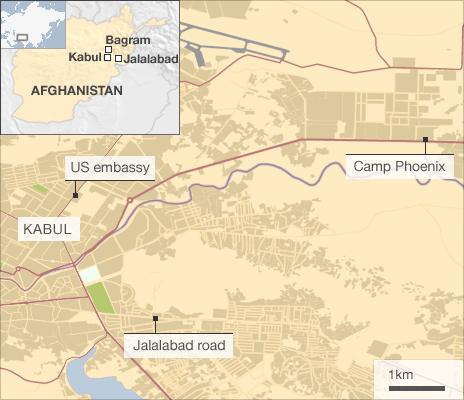Six dead in Afghanistan Koran burning protests
- Published
Second day of protests spread over Afghan Koran burning
At least six people have been killed and dozens injured in Afghanistan after protests spread over the burning of copies of the Koran at a US airbase.
One person was killed in Kabul, one in the eastern city of Jalalabad and at least four in Parwan province.
US officials apologised on Tuesday after Korans were "inadvertently" put in an incinerator at Bagram airbase.
Officials at Bagram reportedly believed Taliban prisoners were using the books to pass messages to each other.
The charred remains of the volumes were found by local labourers.
Pro-Taliban slogans
Protesters in Kabul shouted, "Death to America!" and threw stones at Camp Phoenix, the main US base in the city.
Riot police used water cannon to disperse protesters, some of whom were blocking the road leading to Jalalabad, one of the main trade routes into the capital.
Witnesses said security guards were firing into the air. There were also reports of people chanting pro-Taliban slogans.
One protester in Kabul was killed and 10 wounded.
Four further deaths were confirmed in the Shinwari district of Parwan province, north of Kabul. There were also peaceful protests in the eastern province of Kunar.
In Jalalabad, protesters burned an effigy of US President Barack Obama, and BBC Afghan reporter Babrak Miakhel said oil tankers had been set on fire.
A doctor told the BBC one person had been killed and 10 injured.
One protester in Kabul, 18-year-old Ajmal, told Reuters: "When the Americans insult us to this degree, we will join the insurgents."
The US embassy in Kabul is on lockdown and all travel is suspended.
The Taliban called on Afghan police and soldiers to redeem themselves by turning their guns away from protesters and towards Nato-led troops.
The Afghan parliament held an emergency debate.
In a statement, MPs condemned what had happened, called for punishment of those responsible and asked the Afghan government to send its own delegation to Bagram to establish exactly what happened and why.
"Everyone is emotional," Kabul resident Mohammad Naseer Malikzai told the BBC. "I am hurting and disappointed.

"I created a Facebook group where I was disputing with a lot of people. The American apology is useless."
Another Kabul resident, Farhad Raza, said abusing Islam would prolong the war in Afghanistan.
"These kind of actions [abusing Islam] create a gap between Afghans and Nato forces, and make people hate Nato forces, which will make this war longer than it is now," he told the BBC.
Isaf investigation
US Defence Secretary Leon Panetta said he and the top commander of US and Nato forces in Afghanistan, Gen John Allen, had apologised to the Afghan people "and disapprove of such conduct in the strongest possible terms".
After previous incidents, many Afghans find it hard to understand how US forces could have allowed the Koran to have been burned, says the BBC's Andrew North, in Kabul.
The ISAF spokesman Brigadier General Carsten Jacobson says the incident was an unfortunate mistake.
Afghanistan is a very religious country, he adds, but also one where many people are illiterate and susceptible to attempts to whip up anger.
Muslims consider the Koran the literal word of God and treat each book with deep reverence.
The Nato-led Isaf force is now investigating the incident, a spokesman told the BBC.
"It was the local workers who discovered the nature of the material and therefore stopped worse things from happening," said Brig Gen Carsten Jacobson.
"But it was a mistake and that's what we're investigating at the moment: how did this come to be, what orders were given?
"But at the end of the day we have to stand to the fact a mistake was made and the commander apologised."
Last year, at least 24 people died in protests across Afghanistan after a hardline US pastor burned a Koran in Florida.
On Tuesday, one person was wounded and five detained after troops at Bagram, 60km (40 miles) north of Kabul, fired rubber bullets at protesters.
Bagram includes a prison for Afghans detained by Nato forces.
- Published21 February 2012
- Published3 April 2011
- Published8 April 2011
- Published7 September 2010